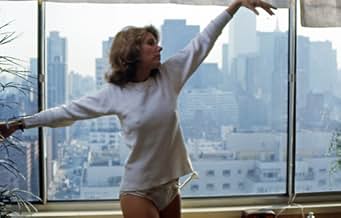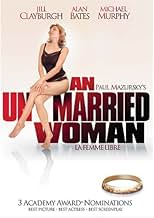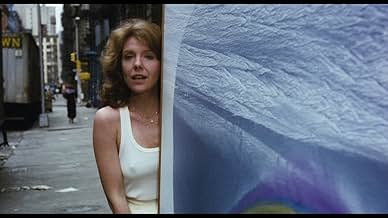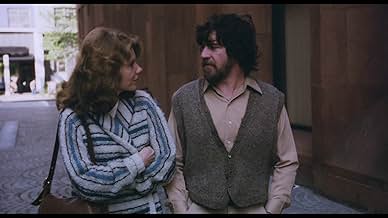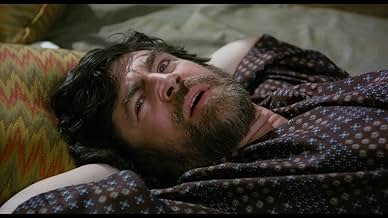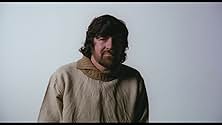Aggiungi una trama nella tua linguaA Manhattan woman struggles with her identity as she tries to move on from a painful divorce.A Manhattan woman struggles with her identity as she tries to move on from a painful divorce.A Manhattan woman struggles with her identity as she tries to move on from a painful divorce.
- Regia
- Sceneggiatura
- Star
- Candidato a 3 Oscar
- 6 vittorie e 18 candidature totali
- Sue
- (as Pat Quinn)
- Cabbie
- (as Chico Martinez)
Recensioni in evidenza
Here Mazursky shows that, whatever else he is accused of being or doing or not-doing (with which I don't always agree or disagree), is a thoughtful director taking a good, long, realistic look at this drama and at more than just its central character. I liked that some scenes ran on for a bit longer than some people find necessary or comfortable, because this is how life's scenes often play out beyond one's wanting them to end swiftly and tidily: indeed, the slight overrunning of some scenes contributes what today might be called "value-added" realism to 'An Unmarried Woman.' After all, Erica has, involuntarily, been thrust into a new life in which she's not at ease in every one of its developing, novel situations.
The saxophone score - probably considered hip in 1977 - is today often more than a trifle annoying; but then it could be said that the score is part of the film's capture of the 70's zeitgeist: like all decades the 70's had its annoyances (not the least of which was the dismal monotony of disco, and all those decor-saturating browns, olives (avocado it was called!), honey-golds, and tawny oranges).
The cinematography here is quite good, nicely tailored to the film's intimate subject, situations, and relationships. Throughout the acting is uniformly good; Jill Clayburgh's effort here is, and will remain I expect, a cinema original and classic. I especially enjoyed - not when I first saw the film but much more so now in 2006 - Cliff Gorman's portrayal of self-satisfied, on-the-make Charlie. Andrew Duncan in the minor role of Bob lends great verisimilitude with his pre-"hair systems" comb-over but especially with the touch of about-to-be-over-the-hill despair in Bob's attempt to bed Erica; Bob demonstrates that most men in that decade, beginning as they were to be flummoxed by emerging liberated women and feminism, still clung to the suddenly obsolescent notion that a divorcée would and should be eager to remarry in order to traditionally assure her security and peace of mind.
At my first viewing I agreed with what Tanya, Erica's therapist, said to Erica about guilt being a manufactured, unnecessary emotion. But a good many more years of living have taught me that guilt is not manufactured, and that without it a person is doomed to emptiness and isolation, and a society is doomed to decadence, and even to barbarism. Rather Tanya should have held that guilt is natural, and that it is one's mature management of it that enables one to distinguish, in oneself and in others, venality and narcissism from generosity of spirit.
'An Unmarried Woman' still stands on its own - more as a socio-cultural than as a cinematic landmark. It's that rare kind of film that's worth watching every five or ten years, if only to help us to recall where we've come from, and to help us to profit from, or to enjoy, a sense of where we might be going.
The wonderful Paul Mazursky created this 1978 landmark slaute to women's liberation and the film wipes the floor with the messy urban horror of 1977's Looking for Mr. Goodbar: Goodbar's makers ultimately had no respect for their female protagonist but Mazursky scores in his depiction of female self-respect and love.
Jill Clayburg's miraculous performance as Erica was snubbed at the Academy Awards in favor of Jane Fonda's more 'tolerable' female in Coming Home but if you look closely you'll see there's no comparison and Clayburg hits all the right notes while displaying Erica's overwhelmingly complex feelings. Perhaps Erica's unique strength was too much for many male Academy members so they rewarded the typical moony-eyed housewife character instead. Regardless of that, Clayburg makes a brilliant lead and her lonely journey through New York-chic (art exhibits, bars, therapists, narcisstic artists) makes for great viewing. (The very brief encounters Erica has with a handsome blonde man at the coatcheck before and after she's been hit with the news from her husband are a nice touch!) There's a rare level of intimacy between the actors in all of the scenes but especially the girl group talks: the words sound surprisingly like they belong to the actors and Mazursky's ear for dialogue is sharp and refreshingly to-the-point.
Michael Murphy as the wayward husband, Alan Bates as the new love interest, and Cliff Gorman -whom I last saw as the bitchy, effeminate in The Boys in the Band!- as a male chauvinist provide exceptional support as the men in Erica's life. The only thing that marres the beauty of this film is its awful, piercingly shrill, '70's saxophone musical score.
WOMAN deals with Erica (Jill Clayburgh), a middle aged, middle class Manhattan housewife who suddenly discovers that her husband has fallen in love with a younger woman and wants a divorce. She responds with predictable anger and outrage, before settling down to the business of "surviving." Divorce is never easy, but as divorcees go, Erica has it awfully good. She is blessed with, in no particular order, a guilt-ridden ex-husband who churns out the checks; a supportive teenaged daughter, who apparently has little interest in her dad; an ad hoc support group made up of girlfriends who cheerfully share in male-bashing self-righteousness; and an indulgent female therapist adept at nodding her head in mechanical approval and dispensing dime-store encouragement. And when it comes time to get back into action, she has no trouble findings a couple of hunky guys, who, by the way, are artists, not boring old businessmen like her ex-hubby, Martin. In short, female bonding goes on all over the place and men are put in their place as convenient sex objects.
Indeed, divorce seems to be a blessing in disguise. Compared to the heroines of films like ALICE DOESN'T LIVE HERE ANYMORE or NORMA RAE, Erica seems to have it pretty darn good. And that is a major problem in the film: it is noticeably lacking drama. Had the film been played more for humor, then Erica's newfound awaking might have had a joyous kick. Instead, Mazursky labors to make serious, i.e., feminist statements about the travails of being a woman in contemporary America. But, boy did he pick the wrong woman to use as a poster child. Since Erica really doesn't have any discernible hardships in her life, the film falls back on the last refuge of feminist self-pity: self-esteem. AN UNMARRIED WOMAN is about Erica learning to feel good about herself. ZZZZZzzzzzzzz.....!
Maybe because I am a male, I found Erica's journey to self-awareness boring. Jill Clayburgh, who plays Erica, was the actress du jour of the era. She had the curious ability to seem sad even when she was happy and vulnerable even as she was being hard-bitten. Unfortunately, this is the way she came off whether the role required it or not. It is what the role of Erica required, but even so I have never found Clayburgh to be a particularly likable actress; she behaves like she is in the movies because she doesn't have a choice. She is not a giving actress. Erica seem perpetually annoyed that she even has to "survive" and Clayburgh acts as though she has something else she'd rather be doing.
Again, perhaps because I am a man, I found the relatively minor character of Erica's husband to be more compelling and more complex. Played by Michael Murphy like an extension of his role in Woody Allen's MANHATTAN, Martin is a cliche -- a middle-aged man walking away from a comfortable marriage in search of something to revitalize his life -- but as cliches go, it is a valid one. Murphy gives a glimpse of a man in emotional and philosophical turmoil; it is a performance that vividly reveals more in a few short scenes than Clayburgh does with all of Erica's tiresome whining. We see why he wanted out of his marriage to Erica, but not why he'd want back in.
Mazursky is not a great director or a particularly skillful writer, but he is even worse as an editor. He has no sense of pace and loves to let scenes ramble far beyond their point of impact. But in his best films, such as BOB & CAROL & TED & ALICE, MOSCOW ON THE HUDSON and DOWN AND OUT IN BEVERLY HILLS he gently mocks self-absorbed, trendy twits. Here, instead of teasing the foibles of his New Yorker of choice, he embraces her. He wants us to know he understands feminine/feminist angst. In a strange way, AN UNMARRIED WOMAN is less about a woman or even women, than about a man trying to prove his liberal credentials by pandering to feminist stereotypes. As such, a film that strives to be realistic ends up being condescendingly phony.
Lo sapevi?
- QuizDr. Penelope Russianoff, who plays Erica (Jill Clayburgh)'s therapist Tanya, was an actual practicing psychologist. The counseling sessions were filmed in her actual penthouse apartment on West 86th Street in New York, where she saw her patients. She worked for two and a half days and was paid US $2500. She was cast after having been recommended to director Paul Mazursky by "Girlfriends" (1978) director Claudia Weill. Russianoff said that she improvised most of her dialogue, which was based on the type of therapy she gave her patients. After the movie was launched, Russianoff became a mini-celebrity. She said the role gave her "instant celebrity-hood," being recognized on the streets of New York, where she signed autographs, and got a number of new clients. She wrote several self-help books in the 1980s, including "Why Do I Think I Am Nothing Without a Man?" (1988), a book first published about a decade after this film, but with a title and subject matter that were reflective of this picture.
- BlooperThe boom is clearly visible for several seconds during the art gallery scene.
- Citazioni
[first lines]
[Martin and Erica are jogging along the river]
Martin: Jesus Christ! Look at this! My sneaker's ruined!
Erica: They're only $35.
[Erica takes Martin's shoe and cleans it off for him]
Martin: Fucking city's turning into one big pile of DOG SHIT!
[shouting at passing traffic]
Martin: Come on out and take a crap on me--everybody else is. Fuck!
[Martin lights a cigarette]
Erica: ...been jogging for 2 1/2 miles - you're giving yourself lung cancer.
Martin: I'll tell you something, Erica: the longer I'm married to you, the more you sound like my mother.
Erica: Clean your own sneaker.
[throws shoe at Martin]
Martin: I think you wanted me to step in it.
Erica: [laughing] You're going crazy, Martin.
Martin: I am?
Erica: [laughing] Yes.
[Martin tosses his shoe over his shoulder into the river. Erica jogs away, and Martin jogs after]
- Curiosità sui creditiFor Betsy
- Colonne sonoreSwan Lake, Op.20
(1877) (uncredited)
Written by Pyotr Ilyich Tchaikovsky
Excerpts danced by Jill Clayburgh
I più visti
- How long is An Unmarried Woman?Powered by Alexa
Dettagli
Botteghino
- Lordo Stati Uniti e Canada
- 24.000.000 USD



